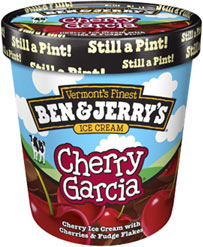Ben & Jerry’s switching to non-GMO ingredients
By Ken Roseboro
Published: February 28, 2013
Category: Non-GMO company Profiles

To access all the articles in this month's issue of The Organic & Non-GMO Report, SUBSCRIBE NOW.
Ice cream maker wants to help increase demand for conventional non-GMO ingredients and foods
Ice cream manufacturer Ben & Jerry’s has committed to switching to all non-GMO ingredients in its ice cream products by the end of this year.
Several factors spurred Ben & Jerry’s to go non-GMO, says Rob Michalak, the company’s global director of social mission. First is a commitment to transparency and consumers’ right to know.
“We’ve had historical support for a consumer’s right to know,” Michalak says. “With GMO labeling legislation being considered in many states, our home state of Vermont included, we thought this was a time to speak out.”
Ben & Jerry’s has long been known for its support of environmental issues, sustainability, and social justice since its founding in 1978 by counter culture heroes Ben Cohen and Jerry Greenfield.
In 1993, the company led the fight for the right to label its products rBGH-free, and more recently has publicly opposed cloned and GMO animals, such as salmon.
Aim to support conventional non-GMO food production
Supporting non-GMO food production was another deciding factor. Michalak sees Ben & Jerry’s in a unique position—between organic and GMO production—where it can stimulate non-GMO demand.
“One of the roles we see our company playing is in the conventional agriculture marketplace,” he says. “We want to play a role in increasing demand for conventional non-GMO ingredients and non-GMO foods and to help create a robust non-GMO agriculture sector.”
Sourcing non-GMO ingredients has always been a goal of Ben & Jerry’s, says Michalak.
Then with growing consumer awareness of GMOs and the demand for labeling, particularly as a result of California’s Proposition 37, Ben & Jerry’s decided to make the complete conversion to non-GMO.
“The whole consumer right to know issue increased our momentum. We thought it was important to become non-GMO by origin and let people know that,” Michalak says.
Sourcing non-GMO ingredients
Eighty percent of the ingredients used in Ben & Jerry’s products are non-GMO, and 26 ice cream flavors are fully non-GMO. These are listed on the company’s website.
The company uses cane sugar instead of beet sugar and high fructose corn syrup, which are derived from GMOs. The St. Albans Cooperative Creamery in Vermont supplies the bulk of rBGH-free milk for the ice cream. All flavors are fair trade certified, which requires they are non-GMO and produced using sustainable methods.
“We have been working to convert the last percentages of the supply chain to non-GMO,” Michalak says.
Ben & Jerry’s already produces all non-GMO products at its facility in the Netherlands.
Sourcing all non-GMO ingredients is a challenge because Ben & Jerry’s products are composite products with many ingredients. Ice cream products contain “inclusions,” which are candies, nuts, and baked goods and these could contain corn syrup, beet sugar, or soy lecithin. All could come from GM sources.
“We have to work with suppliers to go back through the supply chain to make sure everything is non-GMO,” Michalak says.
Ben & Jerry’s is finalizing its non-GMO sourcing standards for suppliers, which will be phased in this year as the company completes its full conversion to non-GMO ingredients. It is expected that suppliers will be required to provide documentation that all raw materials are non-GMO by origin. Finished ingredients supplied to Ben & Jerry’s must have no detectable level of GMO presence as verified through PCR testing. Suppliers will be audited for non-GMO segregation compliance.
Ben & Jerry’s aims to convert the remaining 20% of its ingredients to non-GMO in products produced in North America by the end of 2013. The company will post updates on its non-GMO progress on its website and plans to change its packaging with non-GMO messaging by 2014.
Michalak says Ben & Jerry’s decided not to participate in the Non-GMO Project because of its requirement that animals be fed non-GMO feed.
“That is out of our scope for now. Feed is a major cost for family farmers and we don’t want to place an undue burden on them,” he says.
Still he sees Ben & Jerry’s non-GMO commitment eventually extending to feed as demand increases for non-GMO foods.
Support for GM food labeling
Natural/organic brands owned by large food manufacturers who opposed Proposition 37 were declared “traitor brands” by the Organic Consumers Association and Cornucopia Institute. Ben & Jerry’s was targeted because it is owned by Unilever, which donated $467,000 to defeat Prop 37.
“We did get some consumer backlash from the Cornucopia Institute call-out,” Michalak says. “However, once we explained our position to consumers, most ended up being supportive.”
Unlike the other corporate-owned brands, Ben & Jerry’s is publicly supporting mandatory GM food labeling, in addition to its non-GMO commitment. The company recently expressed support for a labeling bill that has been introduced in the Vermont legislature. The Vermont Public Interest Research Group (VPIRG) praised the company’s stance.
“We’re used to seeing Ben and Jerry’s as a leader when it comes to consumer and environmental protection,” said Falko Schilling, VPIRG’s consumer protection advocate. “But the company deserves extra credit in this case distinguishing their position from their parent company’s actions in favor of consumers’ right to know. This kind of bold, pro-consumer move will give a huge boost to our efforts to pass GMO Right to Know legislation in Vermont.”
© Copyright The Organic & Non-GMO Report, March 2013




